Thomas Kinter
Learn Russian in the European Union
Daugavpils, Latvia
Spring 2022
The time I spent in Latvia was one of the most valuable experiences in my life. I made great friendships with both my fellow students from America and with the people of Daugavpils who taught me so much and made my life there so rich.
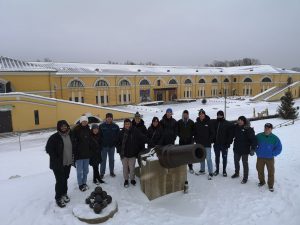
Unfortunately, my time there was cut short when the school cautiously determined that it would be best for me to leave a country so close to Russia as the war in Ukraine grew. While I understand the decision, it is an understatement to say that leaving my host family with an early goodbye was difficult after coming to know them and enjoy being with them so much.
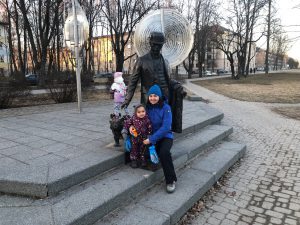
Living in the most Russian city in the European Union gave me quite the place for watching the situation to the south in Ukraine grow worse. Every night my host mother and I would watch the news and see how the war became closer and closer to starting until it finally did. My host mother and many of the people of the city have friends and family in Russia and Ukraine, so learning about what was going on to the south had a far more personal effect. As we learned about the bombs going off in cities like Odessa, my host mother told me about her friend whose home had been destroyed there and who still faced the danger of life there.
In Daugavpils, as in many other cities across Europe, there were protests against the war. Not long after the invasion began in Ukraine, protest were held outside the city’s Russian consulate that was in place there for the large number of Russians in the city. I myself was able to see a protest held at the university where important figures of the city, including one of my own professors, spoke about the situation. I was unable to listen at first because they spoke in Latvian, but I found my school’s director there and he was kind enough to translate some of what was said.
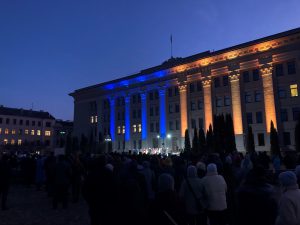
In the capital city of Riga there were also protests. When I visited the city for the second time I saw the freedom monument lit up in blue and yellow in support of Ukraine. That day, like many others, there were Latvians throughout the city with posters going to demonstrations. More often than not the Latvian flag was joined by the flag of Ukraine on buildings throughout the city. In Lithuania’s capital, Vilnius, there too were shows of support for Ukraine. The day I visited the town there was a concert in the main square decorated with Ukrainian flags.
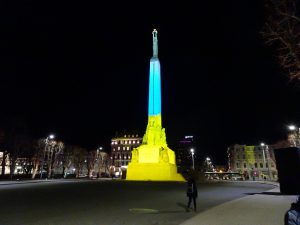
In Latvia there are also those who are against the government’s stance within the EU and within NATO. The Russian-speakers in the country often have strong connections with Russia and are at times doubtful towards the Latvian government that has taken policies against the use of Russian in schools and state activities. While Daugavpils is not a violent place and sympathies for Russia’s actions are not necessarily widespread, there is some skepticism about the policies of the government and whether they are what is best for the people of the area.
After leaving Latvia I was fortunate enough to be able to continue my courses online. With some money from the school for housing I rented an apartment in Munich, Germany because some of the other students were staying nearby. While doing classes on the laptop in my room is far from ideal, I have made the most of being here and have still been able to keep learning.
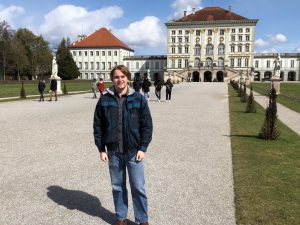
Staying in Munich has been nice, but I have also seen effects here of the war in Ukraine. In a city square I saw another demonstration against the deaths of children from bombings in Ukrainian cities. In the train station and in other parts of town there are guides for Ukrainian refugees entering the city.
My semester ends soon and before long I will be back home in America. One day I would like to see my friends in Daugavpils again, but for now I will just have to remember the conversations I had with them there and the experiences they shared with me.